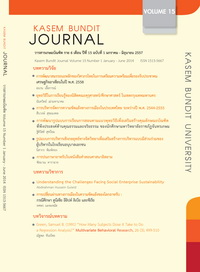การพัฒนารูปแบบการเรียนการสอนตามแนวพุทธวิธีเพื่อเสริมสร้างคุณลักษณะบัณฑิต ที่พึงประสงค์ด้านคุณธรรมจริยธรรม ของนักศึกษามหาวิทยาลัยราชภัฏจันทรเกษม
Keywords:
รูปแบบการเรียนการสอนตามแนวพุทธวิธี, คุณลักษณะบัณฑิตที่พึงประสงค์, instructional model based on Buddhist way, desirable morality characteristicsAbstract
การวิจัยนี้มีวัตถุประสงค์ดังนี้1) เพื่อศึกษาคุณลักษณะบัณฑิตที่พึงประสงค์ด้านคุณธรรมจริยธรรม ของนักศึกษามหาวิทยาลัยราชภัฏจันทรเกษม 2) เพื่อพัฒนารูปแบบการเรียนการสอนตามแนวพุทธวิธีเพื่อเสริมสร้างคุณลักษณะของบัณฑิตด้านคุณธรรมจริยธรรมของนักศึกษามหาวิทยาลัยราชภัฏจันทรเกษม และ3)เพื่อประเมินประสิทธิผลของการใช้รูปแบบการเรียนการสอนตามแนวพุทธวิธีเพื่อเสริมสร้างคุณลักษณะของบัณฑิตที่พึงประสงค์
ประชากรการวิจัยได้แก่นักศึกษามหาวิทยาลัยราชภัฏจันทรเกษมจำนวน 11,863 คน กลุ่มตัวอย่างในการวิจัยในครั้งนี้ แบ่งเป็น 2 กลุ่ม คือ กลุ่มที่ 1 เป็นนักศึกษาระดับปริญญาตรี มหาวิทยาลัยราชภัฏจันทรเกษมจำนวน 468 คน ที่ได้มาจากการสุ่มแบบแบ่งชั้นจากประชากร ใช้ในการศึกษาคุณลักษณะบัณฑิตที่พึงประสงค์ด้านคุณธรรม จริยธรรม กลุ่มที่ 2 เป็นนักศึกษาที่มีคะแนนคุณลักษณะบัณฑิตที่พึงประสงค์ด้านคุณธรรม จริยธรรมตั้งแต่เปอร์เซ็นต์ไทล์ที่ 25 ลงมาจำนวน 40 คนที่ได้มาจากการสุ่มอย่างง่ายจากกลุ่มตัวอย่างกลุ่มที่ 1 แล้วสุ่มเป็นกลุ่มทดลองและกลุ่มควบคุม กลุ่มละ 20 คน กลุ่มทดลองได้รับการใช้รูปแบบการเรียนการสอนตามแนวพุทธวิธี ส่วนกลุ่มควบคุมไม่ได้รับการใช้รูปแบบการเรียนการสอนใด ๆ เครื่องมือที่ใช้ในการวิจัยและวิธีการวิจัย ได้แก่ 1)แบบวัดคุณลักษณะบัณฑิตที่พึงประสงค์ด้านคุณธรรม จริยธรรม มีค่าความเที่ยงทั้งฉบับเท่ากับ .901 และวิเคราะห์ความตรงเชิงโครงสร้างของแบบวัดด้วยการวิเคราะห์องค์ประกอบเชิงยืนยัน 2) รูปแบบการเรียนการสอนตามแนวพุทธวิธีเพื่อเสริมสร้างคุณลักษณะบัณฑิตที่พึงประสงค์ด้านคุณธรรม จริยธรรม มีค่าดัชนีความสอดคล้อง อยู่ระหว่าง.60-1.00 3) แบบประเมินความพึงพอใจที่มีต่อรูปแบบการเรียนการสอนตามแนวพุทธวิธีมีค่าความสอดล้องอยู่ระหว่าง .60 - 1.00 และ 4) การวิเคราะห์เชิงคุณภาพเพื่อประเมินประสิทธิผลตัวแบบการเรียนการสอนตามแนวพุทธวิธีสำหรับกลุ่มทดลองโดยวิธีโฟกัสกรุ๊ป.
ผลการวิจัยสรุปได้ดังนี้ คุณลักษณะบัณฑิตที่พึงประสงค์ด้านคุณธรรม จริยธรรม ของนักศึกษามหาวิทยาลัย ราชภัฏจันทรเกษมที่เป็นกลุ่มตัวอย่าง มีค่าเฉลี่ยโดยรวมอยู่ในระดับสูง ส่วนคุณลักษณะบัณฑิตที่พึงประสงค์ด้านคุณธรรม จริยธรรม ด้านความรับผิดชอบ ความมีระเบียบวินัย และความกตัญญูกตเวที มีค่าเฉลี่ยอยู่ในระดับสูง ส่วนความซื่อตรง ด้านการมีมนุษยสัมพันธ์ และด้านการมีจรรยาบรรณต่อวิชาชีพ มีค่าเฉลี่ยอยู่ในระดับปานกลาง
รูปแบบการเรียนการสอนตามแนวพุทธวิธีเพื่อเสริมสร้างคุณลักษณะบัณฑิตที่พึงประสงค์ด้านคุณธรรม จริยธรรม ประกอบด้วยการเรียนการสอน 6 องค์ประกอบ ได้แก่ รักที่จะเรียนรู้(หลักฉันทะ) มุ่งสู่กระบวนการคิด(หลักโยนิโสมนสิการ) มีมิตรคอยชี้แนะ(หลักกัลยาณมิตร) ฝึกแยกแยะปัญหา(หลักอริยสัจ4) พัฒนาความเป็นผู้นำ(หลักพรหมวิหาร4) และ ผสมผสานการประเมินผล(หลักวิมังสา)
คุณลักษณะบัณฑิตที่พึงประสงค์ด้านคุณธรรม จริยธรรมของนักศึกษากลุ่มทดลองภายหลังได้รับการใช้รูปแบบการเรียนการสอนตามแนวพุทธวิธี และภายหลังการติดตามผลเพิ่มขึ้นกว่าก่อนการทดลองอย่างมีนัยสำคัญทางสถิติที่ระดับ .01
คุณลักษณะบัณฑิตที่พึงประสงค์ด้านคุณธรรม จริยธรรมของนักศึกษากลุ่มทดลอง ภายหลังได้รับการใช้รูปแบบการเรียนการสอนตามแนวพุทธวิธี และภายหลังการติดตามผลเพิ่มขึ้นกว่ากลุ่มควบคุมที่ไม่ได้รับรูปแบบการเรียนการสอนใด ๆ อย่างมีนัยสำคัญทางสถิติที่ระดับ .01
ภายหลังการทดลอง นักศึกษากลุ่มทดลองมีความพึงพอใจต่อรูปแบบการเรียนการสอนตามแนวพุทธวิธี อยู่ในระดับเหมาะสมมากที่สุด และมีความคิดเห็นว่ารูปแบบการเรียนการสอนตามแนวพุทธวิธี สามารถนำไปใช้ในการพัฒนาจิตใจของตนเองให้เจริญงอกงามยิ่งขึ้น
The purposes of this research were the following : 1) To study the desirable morality characteristics of the undergraduate students of Chandrakasem Rajabhat University students, 2) To construct the instructional model based on Buddhist way to enhance the desirable morality characteristics for undergraduate students of Chandrakasem Rajabhat University, and 3) To evaluate the effectiveness of the instructional model based on Buddhist way to enhance the desirable morality characteristics.
The population of this research consisted of 11863 undergraduate students at Chandrakasem Rajabhat University. The sample of the study included two groups. The first group, for desirable morality characteristics study, consisted of 468 undergraduate students selected by means of stratified random sampling from the population. The second group, for the study of the effectiveness of an instructional model based on Buddhist way for enhancing desirable morality characteristics, consisted of 40 undergraduate students of Chandrakasem Rajabhat University, randomly selected from the students in the first group whose desirable morality characteristics were lower than twenty-fifth percentile and volunteered to participate in the experiment. They were then randomly assigned into two groups, classified as an experimental group and a control group. Each group consisted of 20 students. The experimental group participated in the instructional model based on Buddhist way while the control group did not receive such a treatment
The research instruments were 1) the desirable morality characteristics scale with reliability coefficient (alpha) of .91, and its construct validity was confirmed through factor analysis, 2) The instructional model based on Buddhist way for enhancing desirable morality characteristics of the undergraduate students, the Item Objective Congruence of which ranging from 60 – 1.00, 3) an assessment scale of satisfaction towards the instructional model based on Buddhist way, and 4) a qualitative analysis on the experimental group towards the effectiveness of the instructional model based on the Buddhist way through focus group.
The research results were as follows: The total mean score of the desirable morality characteristics of the sample undergraduate students of the Chandrakasem Rajabhat University was high. The mean scores of the dimensions of responsibility, discipline, and gratitude were high while the dimensions of honesty, human relations, and professional ethics were moderate.
The instructional model based on Buddhist way to enhance desirable morality characteristics for undergraduate students of Chandrakasem Rajabhat University included the following six components : Willing to learn (Chanta); Generating thinking process (Yonisomanasikara); Guiding from Kalayanamitra (Kalayanamitra); Problem differentiation Skills (Ariyasaccani); Developing leadership (Promavihan); and Interpreting outcome evaluation (Vimongsa).
The desirable morality characteristics of the experimental group after participating in the instructional model based on Buddhist way, and after the follow-up were significantly higher than before their participation in the experiment at .01 level.
The desirable morality characteristics of the experimental group after participating in the instructional model, and after the follow-up were significantly higher than that of the control group at.01 level.
The experimental group’s satisfaction towards the instructional model appeared to be very high. They also had the opinion that the model was valuable in developing their lives.
Downloads
How to Cite
Issue
Section
License
ทัศนคติ ความคิดเห็นใด ๆ ที่ปรากฏในวารสารเกษมบัณฑิตฉบับนี้เป็นของผู้เขียน โดยเฉพาะ มหาวิทยาลัยเกษมบัณฑิตและบรรณาธิการ ไม่จำเป็นต้องมีความเห็นพ้องด้วย







